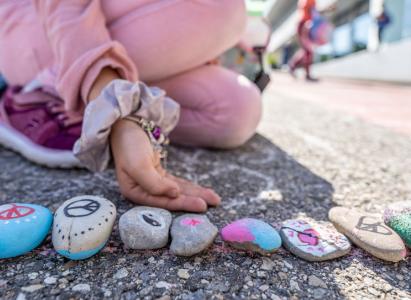Closing address at the Consultative General Assembly, 23 May 2023
The International School of Geneva, born in the ashes of war, was founded for peace across nations. But what is an education for peace? I would put it to you that an education for peace can only take root in a whole institutional culture of peace, from what happens in the classroom to the staffroom to Board meetings. It takes whole system alignment, from the environment we create to the human capabilities we bring out in each other, to the values we promulgate, to our very identity as the world’s first and leading international school.
A culture of peace must be grounded in the great human stories of peace: Ubuntu, where each individual resonates in a greater whole of common humanity: I am because we are; the Confucian tradition: a noble life based on respect and civic responsibility; the Hindu and Buddhist Dharma: a commitment to a just and good life; Sufism’s call for compassion and the Western tradition of Athenian democracy.
A culture of peace is one where we allow freedom of speech, the right of assembly, the right to petition, to stand for election. A culture of peace is one where people feel safe, where there is the right to reply, where human rights are paramount.
But there is a difference between a culture of peace and a culture of human flourishing. As the great commentators of history, Alexis De Tocqueville, Hannah Arendt, Nelson Mandela, have shown, organs of democracy allow for peace to flourish and peace is necessary for social stability. But for humans to flourish, we need more.
To move to higher ground, all of us have to commit to transparency, to open-mindedness, to generosity, to kindness.
For human flourishing we must create principles of assessment that are inclusive, that embrace possibility, that allow not only for what has been but for what might be. In every child there is the promise of tomorrow, and a great school sees this. Our Learner Passport, our holistic educational offering, our open-minded pedagogy, our ever-seeking for gifts in each learner and how to grow those gifts into talents, sets us apart.
In every adult there is the capacity to transform, to grow: we are on a voyage of becoming. Through humane leadership, listening, community building, through a stronger emphasis on the Foundation being a place where we continue to grow, may human flourishing be at the centre of everything we do, for students but also for colleagues.
May we build the path to that higher place with clarity and kindness and with a curriculum that is relevant to the needs of our planet, our society, our human legacy. A curriculum that is student-friendly, that is teacher-friendly, that addresses the social challenges that lie before us: what it means to be human in an age of augmented artificial intelligence, what environmental custodianship means in an Anthropocene era, how inclusion, equity and diversity can bring us together and not cast us asunder, how our pedagogy responds to the need for wellbeing, resilience, how to instil confidence, intercultural competence, empathy and wisdom in our learners. Through our partners at UNESCO and as we build towards our 100th Anniversary, Ecolint has no choice but to lead the way.
We are entering a new era: a change in leadership, we must look back with wisdom and learn from what we have done, and look forward with an ear to the ground, listening to the needs of our students, our parents, our staff: the future will be built together and lived together in the name of peace and human flourishing.
I look forward to building our story of peace and human flourishing at your side. We are in this together.
Thank you for being what we all are together, for being Ecolint.
